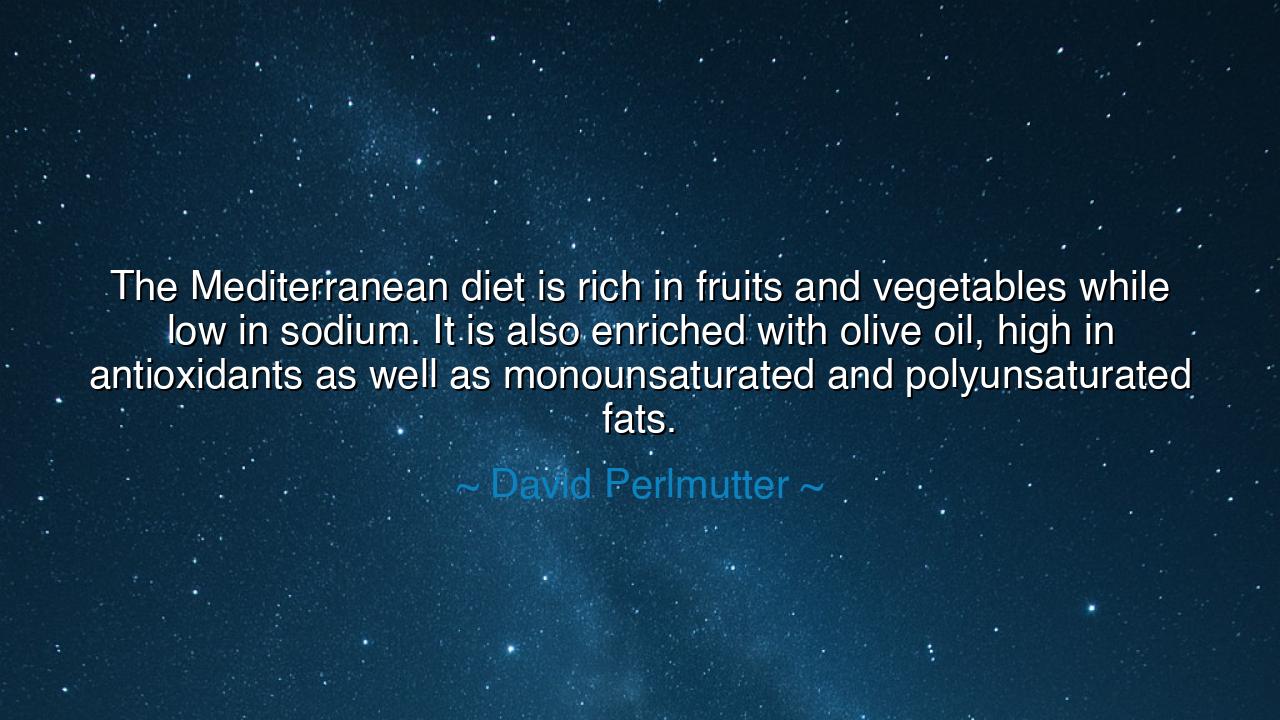
The Mediterranean diet is rich in fruits and vegetables while low
The Mediterranean diet is rich in fruits and vegetables while low in sodium. It is also enriched with olive oil, high in antioxidants as well as monounsaturated and polyunsaturated fats.






When David Perlmutter said, “The Mediterranean diet is rich in fruits and vegetables while low in sodium. It is also enriched with olive oil, high in antioxidants as well as monounsaturated and polyunsaturated fats,” he was not simply describing a way of eating — he was describing a way of life, a sacred harmony between man, nature, and nourishment. His words carry the echo of ancient wisdom, of civilizations that flourished by the sea and learned to draw strength, not from excess or indulgence, but from balance and purity. The Mediterranean diet, to which he refers, is not a modern invention but an inheritance — a living testament to the truth that health, longevity, and joy spring from simplicity and reverence for the earth’s gifts.
At its heart, Perlmutter’s message reveals a profound principle: that food is medicine. The fruits and vegetables of the Mediterranean, vibrant with color and bursting with life, are more than sustenance — they are the embodiment of vitality itself. To eat them is to partake in the living energy of the soil, the sun, and the sea. Their abundance of nutrients, their natural sweetness and freshness, reflect a philosophy older than science — the belief that what the earth provides in its purest form is what the body most deeply craves. And so, when Perlmutter speaks of a diet rich in these foods, he is urging a return — a return to the natural rhythms of nourishment that our ancestors knew instinctively but modern life has forgotten.
The olive oil that he praises, “high in antioxidants and healthy fats,” is more than an ingredient; it is the lifeblood of the Mediterranean soul. Since the days of ancient Greece, olive oil has been revered not only as food but as sacred substance — used to anoint kings, heal wounds, and light temples. The Greeks called it “liquid gold,” and the philosopher Hippocrates, father of medicine, wrote of its healing powers over two thousand years ago. When Perlmutter honors its richness in antioxidants and monounsaturated fats, he is not merely citing chemistry — he is paying homage to this ancient symbol of health and renewal. It is the oil of clarity and strength, drawn from the tree that has witnessed the rise and fall of empires, yet endures, eternal and fruitful.
To speak of the Mediterranean diet is to speak of a culture of moderation and mindfulness. The people who live by this diet — in Italy, Greece, Spain, and beyond — eat not in haste but in community. Meals are shared beneath the sun, with laughter, with conversation, and with gratitude. The food is fresh, not processed; the portions modest, not excessive. Salt, as Perlmutter notes, is used sparingly — for flavor, not addiction. The wisdom here is not merely nutritional but moral: health does not come from control or deprivation, but from balance and appreciation. The act of eating becomes a ritual of connection — with nature, with family, and with the divine order that sustains life.
Consider the story of the island of Ikaria, a small Greek island known as the “place where people forget to die.” There, the inhabitants live long, healthy lives — many well past the age of one hundred. Their secret is no miracle drug, no rigid regimen, but the simple pattern of life that Perlmutter describes: a diet rich in fruits, vegetables, legumes, olive oil, and fish, low in salt and processed foods, paired with movement, laughter, and rest. In their gardens grow figs, grapes, and herbs; in their kitchens, meals are cooked slowly and eaten joyfully. The people of Ikaria live not by rule, but by rhythm — and in that rhythm lies their longevity.
Perlmutter’s words remind us that the science of nutrition is, in truth, a rediscovery of ancient common sense. Long before laboratories measured antioxidants or fats, the wise already understood that the closer one eats to nature, the healthier one becomes. The polyunsaturated fats of fish and nuts, the fibers of grains and legumes, the vitality of fresh produce — these are not trends, but truths, eternal as the tides. His praise for the Mediterranean way is therefore a call to humility: to trust once more in the harmony of the natural world, to see food not as product, but as gift.
And so, my listener, the lesson is clear: return to the roots of nourishment. Eat foods that remember the sun, that have known the soil and the sea. Replace salt with herbs, grease with oil, indulgence with gratitude. Let your meals be simple, your ingredients few, your company cherished. For health is not built in the stomach alone, but in the spirit that eats with awareness. The Mediterranean diet is not only a formula for longevity; it is a philosophy of living well, of honoring the body as temple and the earth as sacred mother.
Remember this, then, as the ancients would say: wholeness begins at the table. The food that sustains you is the same that sustains the olive tree, the vineyard, and the wheat field. To eat wisely is to live in harmony with life itself. Let every meal be your act of gratitude, your hymn to creation — and in doing so, you will not merely live long, but live deeply, beautifully, and well.






AAdministratorAdministrator
Welcome, honored guests. Please leave a comment, we will respond soon